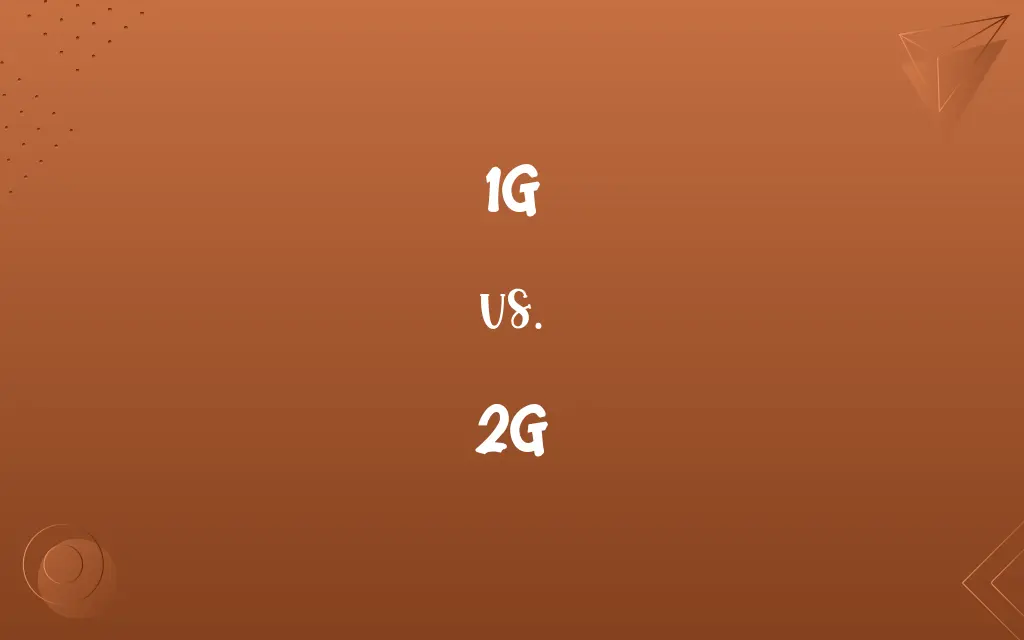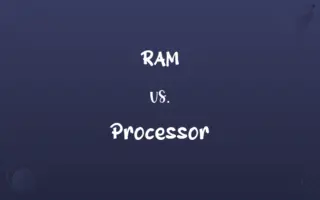1G vs. 2G: Know the Difference

By Shumaila Saeed || Updated on December 25, 2023
1G is the first generation of wireless telephone technology, analog in nature; 2G is the second generation, introducing digital encryption and data services.

Key Differences
1G networks, the first generation of mobile telecommunications, allowed users to make voice calls using analog signal technology. 2G, the second generation, marked the transition to digital encryption for phone conversations, enhancing security against eavesdropping. 1G's analog system provided a foundation for the mobile revolution, with 2G building upon it to introduce new features like SMS and MMS, which were not available with 1G.
Shumaila Saeed
Nov 20, 2023
While 1G networks had a maximum speed of 2.4 kbps, 2G networks increased data transmission speeds to 64 kbps. This speed boost under 2G allowed for better call quality and the introduction of basic Internet services. The shift from 1G to 2G was significant for mobile communications, bringing the concept of mobile data and laying the groundwork for future wireless technology advancements.
Shumaila Saeed
Nov 20, 2023
1G technology relied heavily on the analog transmission of voice, whereas 2G introduced the ability to encode voice into digital signals, allowing for more efficient use of the radio spectrum and reducing interference. Moreover, 2G networks implemented encryption that provided greater security for communication, which was not present in 1G. This digital encryption is what made services like secure mobile payments and confidential communications possible.
Shumaila Saeed
Nov 20, 2023
The introduction of 2G also meant a shift towards more efficient and cost-effective networks. Operators were able to support more users within the same radio bandwidth using 2G compared to 1G. This efficiency also translated into smaller and more power-efficient mobile devices, whereas 1G phones were typically larger and had shorter battery life. The digital nature of 2G also allowed for better international roaming, as digital signals could be more easily standardized across different countries than analog 1G signals.
Shumaila Saeed
Nov 20, 2023
Comparison Chart
ADVERTISEMENT
1G and 2G Definitions
1G
The first generation of mobile telecommunication technology.
My parents reminisce about the days of 1G phones with their bulky designs.
Shumaila Saeed
Nov 10, 2023
ADVERTISEMENT
2G
Provided data services such as SMS and MMS.
2G allowed me to send my first text message.
Shumaila Saeed
Nov 10, 2023
1G
Characterized by poor battery life and large phones.
The 1G phones had to be carried in briefcases due to their size.
Shumaila Saeed
Nov 10, 2023
2G
Enabled efficient use of the spectrum and better battery life.
My phone's battery lasts longer thanks to the 2G network's efficiency.
Shumaila Saeed
Nov 10, 2023
1G
Voice-only communication.
1G networks could not handle text messages or data.
Shumaila Saeed
Nov 10, 2023
2G
Introduced digital encryption for mobile calls.
With 2G, my conversations were secure from eavesdropping.
Shumaila Saeed
Nov 10, 2023
ADVERTISEMENT
1G
Analog wireless technology.
1G technology marked the beginning of mobile communications.
Shumaila Saeed
Nov 10, 2023
2G
Had improved voice call quality over 1G.
I noticed clearer calls when I switched to a 2G network.
Shumaila Saeed
Nov 10, 2023
1G
Had no encryption, leaving calls susceptible to eavesdropping.
Calls on 1G networks were not secure and could be intercepted easily.
Shumaila Saeed
Nov 10, 2023
2G
Offered higher data speeds facilitating basic Internet services.
I could check my emails on the move with the 2G internet service.
Shumaila Saeed
Nov 10, 2023
Repeatedly Asked Queries
What does 2G stand for?
2G stands for the second generation of wireless telephone technology.
Shumaila Saeed
Nov 20, 2023
Did 2G improve security over 1G?
Yes, 2G introduced digital encryption for better security.
Shumaila Saeed
Nov 20, 2023
Can 1G networks send text messages?
No, 1G networks could only handle voice calls.
Shumaila Saeed
Nov 20, 2023
Can 2G handle mobile internet?
2G can handle basic mobile internet services.
Shumaila Saeed
Nov 20, 2023
What does 1G stand for?
1G stands for the first generation of wireless telephone technology.
Shumaila Saeed
Nov 20, 2023
How did 1G phones compare in size to 2G phones?
1G phones were typically larger and less power-efficient than 2G phones.
Shumaila Saeed
Nov 20, 2023
How did 2G affect battery life?
2G's efficiency led to smaller phones with longer battery life.
Shumaila Saeed
Nov 20, 2023
Did 2G improve international roaming?
Yes, the digital nature of 2G improved international roaming capabilities.
Shumaila Saeed
Nov 20, 2023
Were 1G networks efficient?
No, 1G networks supported fewer users per bandwidth compared to 2G.
Shumaila Saeed
Nov 20, 2023
Can I use a 2G phone on a 1G network?
No, as 2G phones are designed for digital networks and 1G is analog.
Shumaila Saeed
Nov 20, 2023
What major feature did 2G introduce?
2G introduced digital encryption and data services like SMS.
Shumaila Saeed
Nov 20, 2023
Were 1G networks secure?
1G networks had minimal security and were susceptible to eavesdropping.
Shumaila Saeed
Nov 20, 2023
Is 2G still operational?
As of my last update, 2G networks were still operational in some parts of the world, but they are gradually being phased out.
Shumaila Saeed
Nov 20, 2023
Did 2G require a different phone than 1G?
Yes, 2G required phones capable of handling digital signals.
Shumaila Saeed
Nov 20, 2023
Could 1G encrypt voice calls?
No, 1G did not have the capability to encrypt voice calls.
Shumaila Saeed
Nov 20, 2023
What is the difference in services offered by 1G and 2G?
1G offered voice calls only, while 2G offered voice calls, SMS, and MMS.
Shumaila Saeed
Nov 20, 2023
Share this page
Link for your blog / website
HTML
Link to share via messenger
About Author
Written by
Shumaila SaeedShumaila Saeed, an expert content creator with 6 years of experience, specializes in distilling complex topics into easily digestible comparisons, shining a light on the nuances that both inform and educate readers with clarity and accuracy.









































































